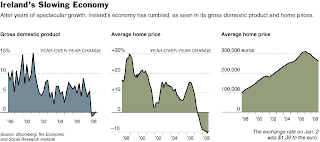Over the past quarter century, Ireland has reinvented itself in a spectacular manner by heavy investments in education and skill development, cuts in taxes, opened up the economy and cut tariffs, introduced flexible labour markets, deregulated financial markets, privatized public utilities and promoted Public Private Partnerships (PPP) and aggressively courted foreign investments. All this had catapulted Ireland to being the fourth richest economy among OECD nations. In many respects, Ireland had come to be considered as the alter ego of the American style of capitalism across the Atlantic.
However, all this appears to have come at a cost. The same excesses that have now become so evident, to disastrous effect, in the US economy as a severe recession takes hold is afflicting the Irish economy too. The "Irish disease" is characterized by the same equity markets, real estate bubbles and reckless bank lending to private developers that have decimated the domestic financial market. The economic recession started earlier and its bite has been deeper. Housing prices have fallen by as much as 50% and bank shares have plummeted by more than 90%, while unemployment is approaching 10%. NYT has this excellent account of the "Irish disease".
The graphic below captures the full story accurately.

None of these events will take away from the fact that Ireland has grown from being one of the weakest economies in Europe to being the most vibrant economy in the continent, spectacularly improving the living standards of its citizens. But the recent events also show that there are very serious costs associated with the type of un-frettered play of markets that the Irish Government had permitted to hold sway for the past two decades.
2 comments:
>>None of these events will take away from the fact that Ireland has grown from being one of the weakest economies in Europe to being the most vibrant economy in the continent, spectacularly improving the living standards of its citizens. But the recent events also show that there are very serious costs associated with the type of un-frettered play of markets that the Irish Government had permitted to hold sway for the past two decades.
What cost? Is the cost that Ireland is one of the most advanced economies in the world while India continues to languish in poverty (half of India, at any rate)... I think this crisis (and so is Japan for that matter) overblown... the level of employment and per capita income is huge (versus us poor country cousins) and economists keep wasting their time trying to find solutions to their problems (as if they had one)... the only real issue in these countries is usually income disparity, which can be resolved if the gvts in there were smart enough to maintain budget surplus and a good social security net (backed by a sovereign fund, if needed)...
Thanks for the comment. However, the comparison with India is irrelevant to any assessment of the "cost" incurred by Ireland. I was referring to the "cost" incurred by the country due to its unqualified embrace of the "unfettered play of markets", a "cost" which could have been minimized if the institutional and other regulatory frameworks were more diligent or stronger.
Further, the fact that Ireland has become one of the most advanced economies by applying these policies cannot be an alibi for their uncritical acceptance, especially when it could have done even better with a more nuanced (or qualified) application of these policies. After all, experiences like these are critical learning points which help in course corrections and guide in future policy making.
And, don't underestimate the costs. The Japanese experience since the early ninesties is the best example of how much damage such crises (especially the property market) can inflict.
Post a Comment